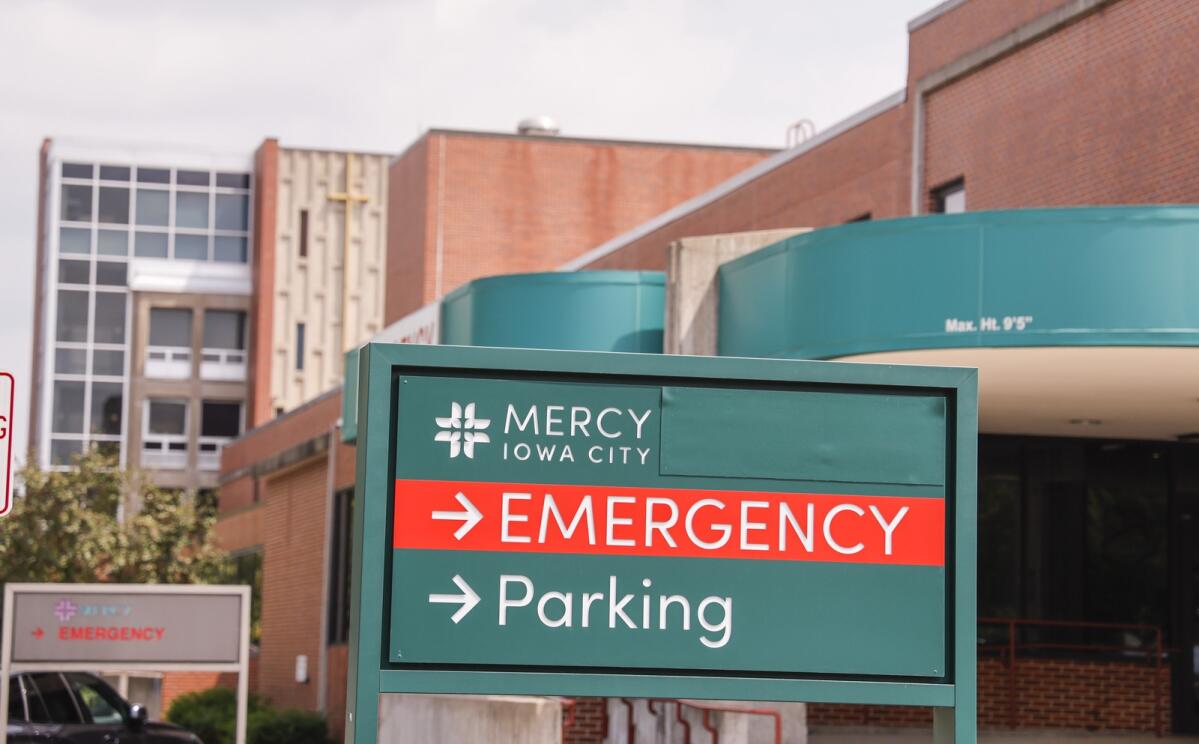In tallying up assets for its Chapter 11 bankruptcy filing — adding together everything from investments and real estate to office furniture and petty cash — Mercy Iowa City is reporting it’s “doubtful’ or even impossible to collect $161.7 million in patient account receivables.
That nearly $162 million is out of $189 million in currently owed patient fees for services billed or rendered — which could include charges not just to patients, but to insurance providers or government payers.
“The health care industry practice is to state accounts receivable at the gross value of the charges,” Mercy officials told The Gazette when asked about the many millions it won’t collect. “Contractual reductions by commercial and government payers, charitable care, and uncollected bad debt substantially reduce the cash collected by the provider/hospital.”
Still, Mercy acknowledged that a deeply flawed rollout of an updated electronic medical record system in March 2022 “created significant operational problems,” including challenges with coding, billing and collecting for patient services.
“Mercy continues to work through the poor implementation of its IT system that negatively impacted its cash collections,” officials said.
⧉ Related article: Couple winning record verdict among Mercy’s creditors
Given the steep value of “doubtful or uncollectable accounts,” Mercy is projecting an actual accounts-receivable value of just $27.5 million — bringing the total worth of its property, cash and cash equivalents, investments and other assets to $235.2 million.
Conversely, in listing all the companies, consultants, individuals and other creditors to whom Mercy owes money, the hospital identified more than 450 with either secured, unsecured priority or unsecured nonpriority claims — totaling well over $79.5 million.
That actual total owed is far higher because Mercy didn’t attach dollar amounts to most of the 22 creditors with claims secured by property — a list that includes Wells Fargo, which started as Mercy’s master trustee for multiple bond issues. The bonds have a combined $62.1 million still due.
It also reported “unknown” amounts owed to a list of 40 creditors with claims that aren’t secured with collateral but hold priority over a list of 396 companies, consultants, lawyers and other individuals with “nonpriority unsecured” claims against Mercy.
Newsletter Signup
 Delivered to your inbox every day
Delivered to your inbox every day
To that nonpriority unsecured group, Mercy owes more than $17.3 million — a figure that, again, likely totals higher because the hospital reported owing “undetermined” amounts to some of them,
Among the hundreds listed in the nonpriority group are 97 Iowa-based businesses or individuals owed a combined total of over $1.9 million, according to The Gazette’s review of court documents.
In bankruptcy, if money is available after claims secured by property, priority unsecured claims are paid first. Most nonpriority unsecured claims are “dischargeable,” according to legal experts, meaning the debt could be eliminated under bankruptcy.

 www.thegazette.com
www.thegazette.com
That nearly $162 million is out of $189 million in currently owed patient fees for services billed or rendered — which could include charges not just to patients, but to insurance providers or government payers.
“The health care industry practice is to state accounts receivable at the gross value of the charges,” Mercy officials told The Gazette when asked about the many millions it won’t collect. “Contractual reductions by commercial and government payers, charitable care, and uncollected bad debt substantially reduce the cash collected by the provider/hospital.”
Still, Mercy acknowledged that a deeply flawed rollout of an updated electronic medical record system in March 2022 “created significant operational problems,” including challenges with coding, billing and collecting for patient services.
“Mercy continues to work through the poor implementation of its IT system that negatively impacted its cash collections,” officials said.
⧉ Related article: Couple winning record verdict among Mercy’s creditors
Given the steep value of “doubtful or uncollectable accounts,” Mercy is projecting an actual accounts-receivable value of just $27.5 million — bringing the total worth of its property, cash and cash equivalents, investments and other assets to $235.2 million.
Conversely, in listing all the companies, consultants, individuals and other creditors to whom Mercy owes money, the hospital identified more than 450 with either secured, unsecured priority or unsecured nonpriority claims — totaling well over $79.5 million.
That actual total owed is far higher because Mercy didn’t attach dollar amounts to most of the 22 creditors with claims secured by property — a list that includes Wells Fargo, which started as Mercy’s master trustee for multiple bond issues. The bonds have a combined $62.1 million still due.
It also reported “unknown” amounts owed to a list of 40 creditors with claims that aren’t secured with collateral but hold priority over a list of 396 companies, consultants, lawyers and other individuals with “nonpriority unsecured” claims against Mercy.
Daily News
Newsletter Signup

To that nonpriority unsecured group, Mercy owes more than $17.3 million — a figure that, again, likely totals higher because the hospital reported owing “undetermined” amounts to some of them,
Among the hundreds listed in the nonpriority group are 97 Iowa-based businesses or individuals owed a combined total of over $1.9 million, according to The Gazette’s review of court documents.
In bankruptcy, if money is available after claims secured by property, priority unsecured claims are paid first. Most nonpriority unsecured claims are “dischargeable,” according to legal experts, meaning the debt could be eliminated under bankruptcy.
Mercy I.C.: $162M in patient fees ‘doubtful’ to be paid
A deal with a consultant shows it could be paid a “success fee” of $250,000 if it arranges a sale to continue Mercy’s health care mission.